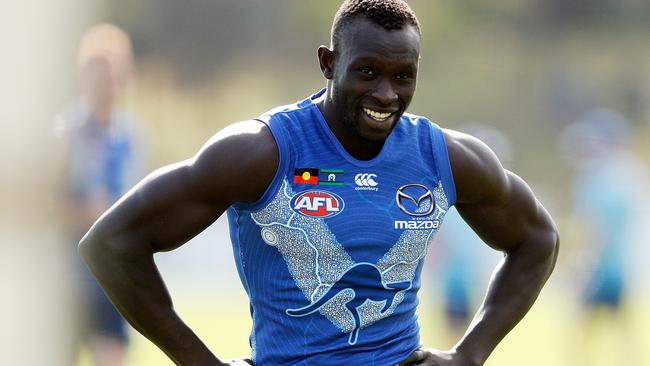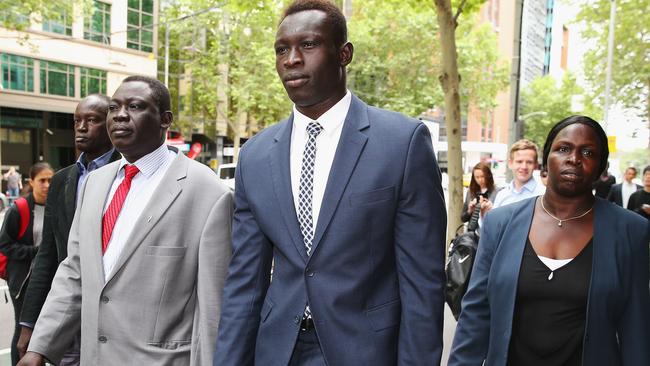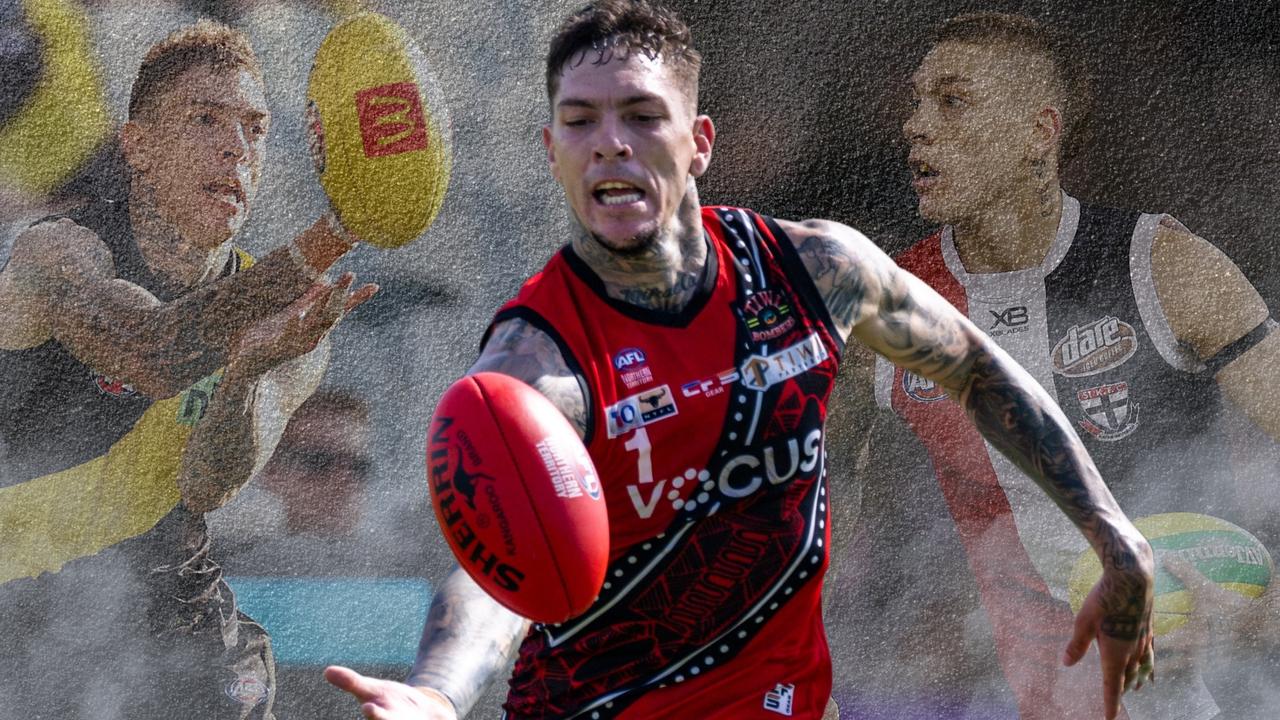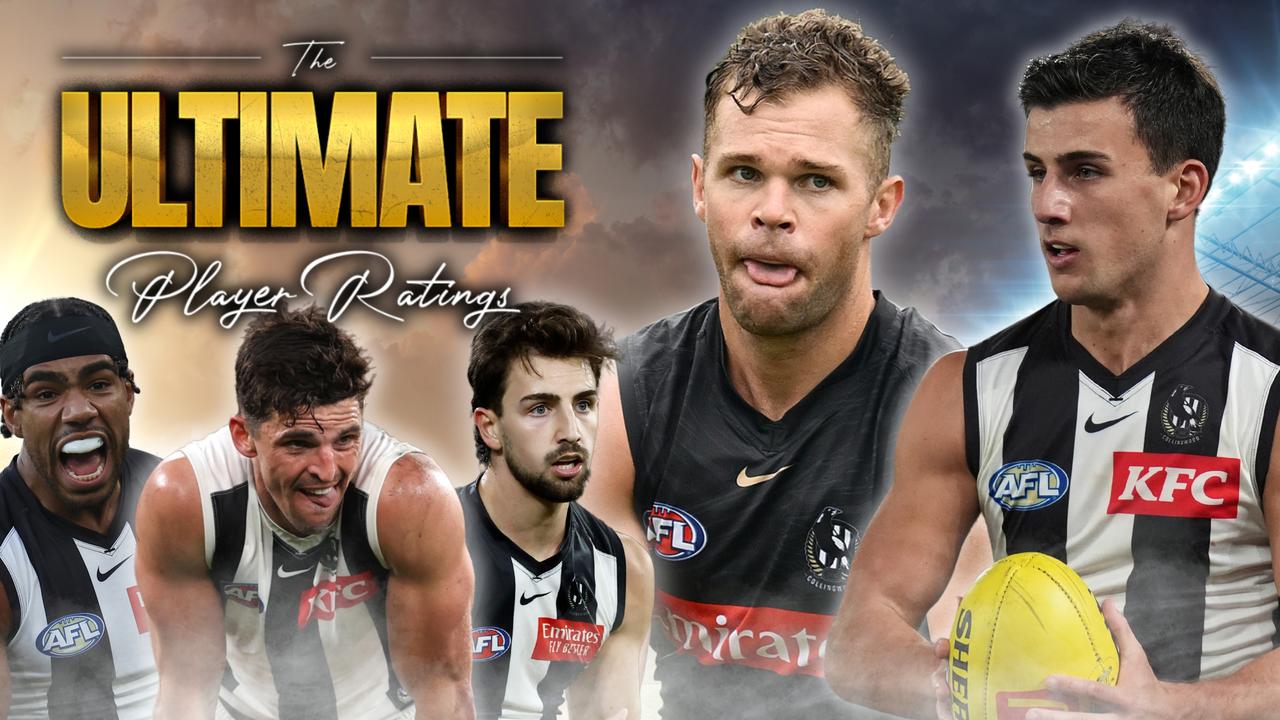Majak Daw: fame hid pain of AFL trailblazer who tackled two worlds
Deep inside Majak Daw there is a dangerous fault line. Late on Monday night, it nearly swallowed him whole.

If you were to engineer the perfect footballer he would look like Majak Daw: chest and arms sculpted from onyx; legs that can leap over lesser men; a physique more commonly found in the cartoon superheroes invented by Marvel than the AFL players who compete in its namesake stadium.
Yet deep inside Daw there is a dangerous fault line. Late on Monday night, it nearly swallowed him whole.
Earlier in the day, while his North Melbourne teammates slogged through the ritual of pre-Christmas training, Daw was off the track, recovering from foot surgery. He was also running towards a dark place.
That evening a self-destructive sequence of events unfolded. He fought with his girlfriend. He took a dose of Stilnox, a sleeping medication notorious for its mind-altering side effects. He mixed this with Melatonin, another sedative. Then he reached for his car keys.
They found his abandoned vehicle at the top of Melbourne’s Bolte Bridge, an eight-lane, concrete expanse that overlooks Marvel Stadium, where North Melbourne plays its home games.
They found Daw in the murky waters of the Yarra River, 25m below. Miraculously, the impact of the water broke his hips and pelvis but did not end his life.
Fellow motorists raised the alarm at about 11pm. Police and paramedics arrived at the scene fast enough to pull the famous AFL footballer to safety.
He was yesterday in a stable condition in the Royal Melbourne Hospital, being prepared for surgery.
It is not the first time Daw has self-harmed. Throughout the most recent football season, a season where he shifted into defence and established himself as a regular member of the Kangaroos senior team, he waged a private battle with mental illness.
Club doctors and key people at Arden Street tried to help him.

Today they will be asking themselves, along with his family, whether there is anything more they could have done.
“Our primary concern is his mental and physical health and wellbeing, and also the wellbeing of his family, friends, teammates, coaches and staff at the club,’’ the club president Ben Buckley said.
“The club is providing full and ongoing support for Majak and his family and also the players and the wider club community.’’
Daw’s near-fatal fall, which is being treated as a suspected suicide attempt, has shocked the South Sudanese and African communities for whom he is a powerful symbol of perseverance, strength and integration.
His remarkable journey to the AFL, from war-ravaged Sudan to three years spent as a refugee in Egypt to eventual settlement with his mum, dad and eight brothers and sisters in Melbourne’s west, is a totemic story for a community that has felt besieged by an intense media and political focus on violent crimes committed by young South Sudanese offenders.
Daw is the first Sudanese Australian to play in the AFL. Others, such as Sydney’s Aliir Aliir, have followed. South Sudanese community leader Richard Deng spoke yesterday to William Daw, Majak’s father.
“It is shocking, in the community, to hear what happened to Majak Daw last night,’’ Mr Deng told The Australian.
“As a community, as Victorians, we stand with his family, we stand with Majak. Our thoughts and prayers are with Majak.’’
John Kuot, a prominent advocate for South Sudanese Australians, described Daw’s fall as a community tragedy.
“Majak is a role model for every young person in our community who is an aspiring sports person,’’ he said.
“It is a sad day for African Australians but particularly for the South Sudanese community as we pray for our brother.’’
Mr Kuot said South Sudanese people were confronting the same mental health issues as the broader community, with a desperate need for better services, education and awareness: “It is not a cultural taboo, but it is a collective challenge.’’
The apparent suicide attempt by Daw will cause the AFL to question its own approach. Jake Edwards, a retired Carlton player who tried to kill himself after his AFL career ended, said the AFL and its clubs were reluctant to speak openly about suicide: “I’m scared this is going to be pushed under the carpet. We will go into Christmas, footy is quiet for three weeks and nothing gets done about it. Beyond Majak, there is a bigger conversation that has to be had here.
“We are just lucky right now that we are not having a different conversation about a young man who has clearly had some challenges on and off the field who has committed suicide. We are going to get to that point. I could name 10 AFL players who have contacted me over the past two years who are going through the same issues and suicide is very much a part of their lives, week in and week out.’’
After surviving his own mental health crisis, Edwards established Beyond the Locker Room, a not-for-profit organisation that helps athletes confront drug abuse, domestic violence, mental illness and suicide. In his talks, Edwards speaks frankly about his suicide attempt.
An AFL club last week cancelled his scheduled visit.
“They didn’t want thoughts about suicide going through their players’ minds,’’ Edwards said.
“I felt it was a complete, red tape cop-out to avoid any potential welfare risk down the track.’’
The AFL Players Association argues professional footballers experience the same level of mental health problems as men of their age in the broader community. Wayne Schwass, a retired AFL player who struggled with depression throughout his career, said this missed the point.
“Where I think the problem starts and finishes is they are not sure what to do,” he said. “We just don’t know how to talk about this issue. We are not having an open, honest and sometimes uncomfortable conversation.’’
Schwass says this includes talking about suicide: “I put myself in three life-threatening situations in my career. When I collected my premiership medal on the dais in 1996 I was suicidal. So it is pretty serious.’’
If this story has raised concerns for you or someone you know, you can contact Lifeline on 13 11 14, BeyondBlue on 1300 22 46 36 or MensLine Australia on 1300 789 978


